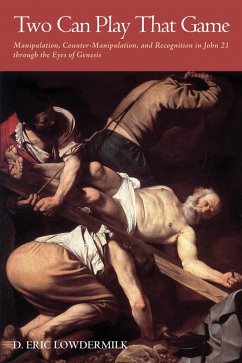
Two Can Play That Game (eBook, ePUB)
Manipulation, Counter-Manipulation, and Recognition in John 21 through the Eyes of Genesis
Versandkostenfrei!
Sofort per Download lieferbar
29,95 €
inkl. MwSt.
Weitere Ausgaben:

PAYBACK Punkte
15 °P sammeln!
John 21 portrays seven disciples fishing all night yet catching nothing. In the morning, a shoreline stranger instructs them to recast their net. Surprisingly, the disciples fail to recognize him. After a miraculous catch and subsequent breakfast, however, there is no doubt as to who this stranger is. Jesus then questions Peter about his love and commissions him to feed Jesus' sheep. Using narrative criticism, Lowdermilk examines this recognition scene, asking, "How would a reader, well acquainted with recognition and deception as portrayed in Genesis, understand John 21?" He discards "trickst...
John 21 portrays seven disciples fishing all night yet catching nothing. In the morning, a shoreline stranger instructs them to recast their net. Surprisingly, the disciples fail to recognize him. After a miraculous catch and subsequent breakfast, however, there is no doubt as to who this stranger is. Jesus then questions Peter about his love and commissions him to feed Jesus' sheep. Using narrative criticism, Lowdermilk examines this recognition scene, asking, "How would a reader, well acquainted with recognition and deception as portrayed in Genesis, understand John 21?" He discards "trickster" terminology and argues that biblical recognition occurs within a context of "manipulation." After proposing a detailed taxonomy of manipulation, he ventures further and argues for patterns in Genesis where manipulators are "counter-manipulated" in a reciprocal manner, ironically similar to their own behavior, providing a transforming effect on the manipulator. These findings, plus a careful examination of Greek diminutives, inform Lowdermilk's new reading of John 21:1-19. Peter withholds his identity as a disciple in John 18 and later Jesus actively withholds his identity in ironic counter-manipulation, mirroring Peter's denials. Jesus' threefold questioning of Peter continues the haunting echoes of Peter's earlier denials. Will it result in a disciple transformed?
Dieser Download kann aus rechtlichen Gründen nur mit Rechnungsadresse in A, D ausgeliefert werden.



